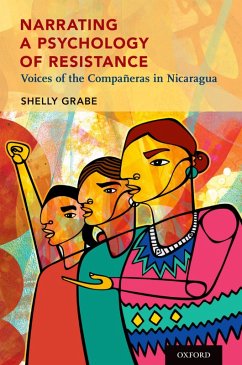
Narrating a Psychology of Resistance (eBook, ePUB)
Voices of the Compañeras in Nicaragua
Versandkostenfrei!
Sofort per Download lieferbar
45,95 €
inkl. MwSt.
Weitere Ausgaben:

PAYBACK Punkte
23 °P sammeln!
The Movimiento Autónomo de Mujeres (Women's Autonomous Movement) in Nicaragua - birthed in part from the Sandinista Revolution of the 1980s - represents one of the largest, most diverse, and most autonomous women's movements in all of Latin America. While it's true that scholars across a wide range of disciplines have written invariably about this social movement (and have been instrumental in arguing that these women are not mere victims, but individuals who have worked hard to resist oppression and fight injustice for decades) what remains missing from this body of work is scholarship aimed...
The Movimiento Autónomo de Mujeres (Women's Autonomous Movement) in Nicaragua - birthed in part from the Sandinista Revolution of the 1980s - represents one of the largest, most diverse, and most autonomous women's movements in all of Latin America. While it's true that scholars across a wide range of disciplines have written invariably about this social movement (and have been instrumental in arguing that these women are not mere victims, but individuals who have worked hard to resist oppression and fight injustice for decades) what remains missing from this body of work is scholarship aimed at understanding, specifically, the psychology of resistance; in other words, what are the psychological mechanisms and methodologies that emerge from the margins that determine the kind of social action that revolutionizes societies? Investigating the psychosocial processes behind resistance is critical to understanding a commitment to justice and the development of subjectivity necessary for enacting the political activity required for social transformation. Psychology, in particular, as author Shelly Grabe argues, is positioned to engage in a systematic exploration of the links between social and political conditions that determine how, why, and under what circumstances resistance emerges. Narrating a Psychology of Resistance documents the first-hand accounts of the Nicaraguan women's Movimiento: a coordinated mobilization of women that has weathered unremitting power differentials characterized by patriarchy and capitalism. In this collection of testimonios, Grabe gives voice to these extraordinary women and closely examines how psychological processes that emerge in response to sociopolitical oppression can lead to gendered justice and the revolutionizing of societies at large.
Dieser Download kann aus rechtlichen Gründen nur mit Rechnungsadresse in A, B, BG, CY, CZ, D, DK, EW, E, FIN, F, GR, HR, H, IRL, I, LT, L, LR, M, NL, PL, P, R, S, SLO, SK ausgeliefert werden.













